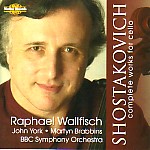Raphael Wallfisch recorded the First Cello Concerto for Chandos, one of the very first CD releases on that label, coupled with the Barber Concerto. It was a good performance, but it pales in comparison with his remake here. This set offers what is, hands down, the finest pairing of the two Shostakovich Cello Concertos since Heinrich Schiff and the composer’s son–with all due respect to Rostropovich–set the modern standard in this music (on Philips). The First Concerto comes across with positively frightening intensity, a product not just of Wallfisch’s strong projection of the solo, but also owing much to the take-no-prisoners accompaniments of Martyn Brabbins and the BBC Symphony. Just listen to the interplay between Wallfisch and the sneering, threatening woodwind section–it’s what this music is all about.
At the opening of the second movement, Wallfisch adopts a dusky, gamba-like sonority: think of Dowland’s Lachrymae. The instrument truly seems to weep through the music, while the finale acquires an extra degree of bitter edge by being played very rhythmically, but not too quickly. Wallfisch really comes into his own in the cadenza, holding the entire movement together through perfect timing and a wide range of tone colors and dynamics. It’s a great performance, as is that of the comparatively neglected Second Concerto.
Again we find soloist, conductor, and orchestra keenly attuned to the music’s overt emotionalism. In the first movement, Wallfisch and Brabbins subtly characterize both the first and second subjects, preventing any hint of monotonous sameness in the exposition section. The development rises to a splendidly impassioned climax, followed by a ghostly coda that never drags.
In the central scherzo, once again a comparatively deliberate tempo combines with punchy rhythms to the music’s expressive advantage, while the lengthy half-sweet, half-grotesque variation-finale never has been so colorfully projected. This is such a beautiful work; only the fact that it ends quietly and mysteriously conspires to keep it in the shadow of the First Concerto. In some ways it’s even more melodically appealing, and this is a performance that captures its wide-ranging expression as well or better than any other.
The inclusion of the Cello Sonata and the cello arrangement of the late Viola Sonata, along with two miscellaneous short pieces, completes a package offering all of Shostakovich’s music featuring solo cello. In the chamber works, John York is the sensitive piano accompanist, and both he and Wallfisch offer excellent interpretations of both large works. The finale of the Viola/Cello Sonata is particularly well held-together, with the youthful freshness of the earlier “true” Cello Sonata enthusiastically captured.
The engineering in the concertos is absolutely outstanding: balances between cello and orchestra are perfectly judged, but the microphones still capture a tremendous amount of ear-catching detail. Obviously a great deal of credit for this has to go to Brabbins and the orchestra, who offer none of that generic, lazy professionalism so common today. These performances display an idiomatic style of a kind that you seldom find even inside Russia today (witness Pletnev’s often bland Russian National Orchestra, or Gergiev’s mediocre Kirov band). The result is an absolutely irresistible set that no fan of Shostakovich will want to miss.
































